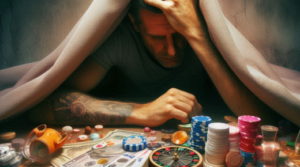
In the modern world, discussions around health have rightfully expanded beyond physical symptoms to include emotional and mental well-being. Among the many behavioral health concerns rising in prevalence today is problem gambling—an often overlooked issue that can quietly deteriorate a person’s life from the inside out.
While gambling itself is a legal and even socially accepted activity in many parts of the world, there’s a stark line between entertainment and compulsion. With the proliferation of online gambling platforms, the risk of developing unhealthy habits is greater than ever—and it’s something both healthcare professionals and everyday individuals should be paying attention to.
Understanding the Psychological Grip of Gambling
Problem gambling, sometimes referred to as gambling disorder, isn’t merely a bad habit or lack of discipline. It’s a medically recognized mental health condition classified by the American Psychiatric Association (APA) under the umbrella of behavioral addictions.
At its core, gambling activates the brain’s reward system in ways very similar to drug addiction. Each win triggers a surge of dopamine, the feel-good neurotransmitter, creating a feedback loop that encourages repeated play—even when the consequences become harmful.
Over time, individuals begin to chase losses, gamble beyond their means, and experience withdrawal-like symptoms when trying to stop. This escalation is exactly what makes gambling addiction so insidious. It thrives in silence, often masked by secrecy, denial, and shame.
The Health Consequences No One Talks About
Many people are unaware of how deeply gambling can impact not only mental health but also physical well-being. Individuals struggling with problem gambling frequently report:
- Chronic stress and anxiety
- Sleep disturbances and insomnia
- Digestive issues and migraines
- Increased substance abuse (alcohol, tobacco, or drugs)
- Heightened risk of depression and suicidal ideation
Financial instability and strained relationships only exacerbate the situation, often creating a downward spiral that seems impossible to escape without professional help.
According to various health studies, problem gamblers are more likely to neglect basic self-care, skip medical appointments, and experience isolation—all of which can have long-term repercussions on their health.
Digital Temptations: The Role of Online Gambling
In today’s digital-first society, gambling has evolved far beyond slot machines and poker tables. Online casinos are available 24/7, often just a tap away on your smartphone. While many of these platforms promote responsible play, the sheer accessibility of gambling apps and websites poses a real challenge for those at risk.
Some platforms use game mechanics that encourage prolonged engagement, like near-miss scenarios or “daily rewards,” mimicking the addictive behavior loops seen in mobile gaming. This blurred line between gaming and gambling has made it increasingly easy for users to slide into compulsive behavior without realizing it.
For those seeking more information about the signs and risks of compulsive gambling, this comprehensive guide to gambling problems breaks down the symptoms, warning signs, and where to get help in a clear and approachable way.
Recognizing the Signs in Yourself or a Loved One
It’s often difficult to acknowledge when gambling has gone too far. Unlike substance abuse, the physical signs are not always visible. Here are a few red flags to watch out for:
- Feeling irritable or anxious when trying to stop gambling
- Constantly thinking about past or future gambling sessions
- Lying to family or friends about gambling habits
- Gambling more money than intended or needed
- Neglecting responsibilities, work, or relationships due to gambling
- Borrowing money or selling possessions to fund gambling
If you or someone you know exhibits these symptoms, it’s essential to understand that help is available—and recovery is absolutely possible.
Steps Toward Recovery: Where to Begin
The first step in overcoming problem gambling is acknowledgment. From there, several strategies can aid in recovery:
- Seeking Professional Therapy
Cognitive-behavioral therapy (CBT) has shown high success rates in helping individuals change gambling-related thought patterns. - Support Groups
Organizations like Gamblers Anonymous offer peer support, a powerful motivator during recovery. - Self-Exclusion Programs
Many online gambling sites offer tools that allow users to block themselves from logging in or placing bets. - Financial Counseling
Tackling the debt or financial distress caused by gambling is a major part of regaining stability. - Lifestyle Changes
Adopting healthy habits, such as regular exercise, mindfulness practices, and building new hobbies, can help shift focus away from compulsive urges.
Final Thoughts: Awareness Is the First Line of Defense
Gambling, when kept within limits, can be a fun and even social activity. But like many forms of stimulation, it has a darker side that thrives in silence. With the rise of online platforms and the normalization of betting culture, we need to remain vigilant—not just as individuals but as a society that cares about holistic well-being.
Understanding the psychological roots of gambling problems, as well as their ripple effects on health, is key to addressing the issue head-on. Resources like the Casino Mary blog on gambling problems are crucial tools in spreading awareness and guiding people toward the help they deserve.
Remember, addressing a gambling problem isn’t a sign of weakness—it’s a profound act of courage and self-care.






